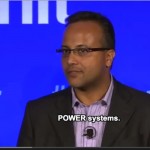Axel Koehler from Nvidia presented this talk at the HPC Advisory Council Switzerland Conference. “Accelerated computing is transforming the data center that delivers unprecedented throughput, enabling new discoveries and services for end users. This talk will give an overview about the NVIDIA Tesla accelerated computing platform including the latest developments in hardware and software. In addition it will be shown how deep learning on GPUs is changing how we use computers to understand data.”
Advancing HPC with Collaboration & Co-design
In this special guest feature from Scientific Computing World, Tom Wilkie reports on two US initiatives for future supercomputers, announced at the ISC in Frankfurt in July.
Steve Oberlin on How NVLink will Power Coral Supercomputers
NVlink will be the backbone of 150 Petaflop Coral supercomputers coming to ORNL and LLNL. As the world’s first high-speed GPU interconnect, NVLink will let data move between GPUs and CPUs 5-12 times faster than possible today.
Test Bed Systems Pave the Way for 150 Petaflop Summit Supercomputer
Oak Ridges is preparing for their upcoming Summit supercomputer with two modest test bed systems using Power8 processors. “Summit will deliver more than five times the computational performance of Titan’s 18,688 nodes, using only approximately 3,400 nodes when it arrives in 2017.”
Slidecast: Nvidia/IBM to Build Two Coral 100+ Petaflop Supercomputers in 2017
In this slidecast, Sumit Gupta from Nvidia describes the company’s big win with IBM for two DOE supercomputers for deployment in 2017. The two machines will feature IBM POWER9 processors coupled with Nvidia’s future Volta GPU technology. NVLink will be a critical piece of the architecture as well, along with a system interconnect powered by Mellanox.
Nvidia to Offer Full CUDA Support for OpenPOWER in 4Q2014
“Nvidia is adding CUDA software support for GPUs with IBM POWER CPUs. IBM and Nvidia are demonstrating the first GPU accelerator framework for Java, showing an order of magnitude performance improvement on Hadoop Analytics applications compared to a CPU-only implementation.”








